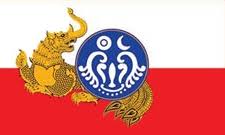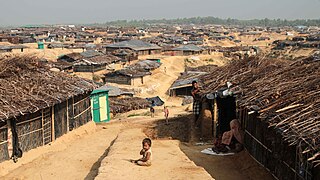Contents
| |||||
| Decades: | |||||
|---|---|---|---|---|---|
| See also: | |||||
| |||||
| Decades: | |||||
|---|---|---|---|---|---|
| See also: | |||||

Crimes against humanity are certain serious crimes committed as part of a large-scale attack against civilians. Unlike war crimes, crimes against humanity can be committed during both peace and war and against a state's own nationals as well as foreign nationals. Together with war crimes, genocide, and the crime of aggression, crimes against humanity are one of the core crimes of international criminal law and, like other crimes against international law, have no temporal or jurisdictional limitations on prosecution.
The Convention on the Prevention and Punishment of the Crime of Genocide (CPPCG), or the Genocide Convention, is an international treaty that criminalizes genocide and obligates state parties to pursue the enforcement of its prohibition. It was the first legal instrument to codify genocide as a crime, and the first human rights treaty unanimously adopted by the United Nations General Assembly, on 9 December 1948, during the third session of the United Nations General Assembly. The Convention entered into force on 12 January 1951 and has 153 state parties as of June 2024.

Human rights in Myanmar under its military regime have long been regarded as among the worst in the world. In 2022, Freedom House rated Myanmar’s human rights at 9 out 100.

The Rohingya people are a stateless ethnic group who predominantly follow Islam and reside in Rakhine State, Myanmar. Before the Rohingya genocide in 2017, when over 740,000 fled to Bangladesh, an estimated 1.4 million Rohingya lived in Myanmar. Described by journalists and news outlets as one of the most persecuted minorities in the world, the Rohingya are denied citizenship under the 1982 Myanmar nationality law. There are also restrictions on their freedom of movement, access to state education and civil service jobs. The legal conditions faced by the Rohingya in Myanmar have been compared to apartheid by some academics, analysts and political figures, including Nobel laureate Bishop Desmond Tutu, a South African anti-apartheid activist. The most recent mass displacement of Rohingya in 2017 led the International Criminal Court to investigate crimes against humanity, and the International Court of Justice to investigate genocide.
There is a history of persecution of Muslims in Myanmar that continues to the present day. Myanmar is a Buddhist majority country, with significant Christian and Muslim minorities. While Muslims served in the government of Prime Minister U Nu (1948–63), the situation changed with the 1962 Burmese coup d'état. While a few continued to serve, most Christians and Muslims were excluded from positions in the government and army. In 1982, the government introduced regulations that denied citizenship to anyone who could not prove Burmese ancestry from before 1823. This disenfranchised many Muslims in Myanmar, even though they had lived in Myanmar for several generations.

Insurgencies have been ongoing in Myanmar since 1948, when the country, then known as Burma, gained independence from the United Kingdom. It has largely been an ethnic conflict, with ethnic armed groups fighting Myanmar's armed forces, the Tatmadaw, for self-determination. Despite numerous ceasefires and the creation of autonomous self-administered zones in 2008, armed groups continue to call for independence, increased autonomy, or federalisation. It is the world's longest ongoing civil war, spanning almost eight decades.
The 2012 Rakhine State riots were a series of conflicts primarily between ethnic Rakhine Buddhists and Rohingya Muslims in northern Rakhine State, Myanmar, though by October Muslims of all ethnicities had begun to be targeted. The riots started came after weeks of sectarian disputes including a gang rape and murder of a Rakhine woman which police allege was committed by three Rohingya Muslims. On 8 June 2012, Rohingyas started to protest from Friday's prayers in Maungdaw township. More than a dozen residents were killed after police started firing. A state of emergency was declared in Rakhine, allowing the military to participate in administration of the region. As of 22 August 2012, officially there were 88 casualties: 57 Muslims and 31 Buddhists. An estimated 90,000 people were displaced by the violence. Around 2,528 houses were burned; of those, 1,336 belonged to Rohingyas and 1,192 belonged to Rakhines.

The Rohingya conflict is an ongoing conflict in the northern part of Myanmar's Rakhine State, characterised by sectarian violence between the Rohingya Muslim and Rakhine Buddhist communities, a military crackdown on Rohingya civilians by Myanmar's security forces, and militant attacks by Rohingya insurgents in Buthidaung, Maungdaw, and Rathedaung Townships, which border Bangladesh.

The Arakan National Party, is a political party in Myanmar (Burma), representing the interests of the Rakhine people in Rakhine State and Yangon Region. The party was founded on 13 January 2014 and registered with the Union Election Commission on 6 March 2014. The chairman of the ANP is Thar Htun Hla. The party is known for its hardline ethnic nationalist stance, as well as its Islamophobic and anti-Rohingya positions. Some members of the party were involved in instigating violence against Rohingya people during the communal riots in 2012, which left dozens dead and thousands homeless.

In 2015, hundreds of thousands of Rohingya people were forcibly displaced from their villages and IDP camps in Rakhine State, Myanmar, due to sectarian violence. Nearly one million fled to neighbouring Bangladesh and some travelled to Southeast Asian countries including Malaysia, Indonesia, Cambodia, Laos and Thailand by rickety boats via the waters of the Strait of Malacca, Bay of Bengal and the Andaman Sea.
The following lists events in the year 2017 in Myanmar.

The Rohingya genocide is a series of ongoing persecutions and killings of the Muslim Rohingya people by the military of Myanmar. The genocide has consisted of two phases to date: the first was a military crackdown that occurred from October 2016 to January 2017, and the second has been occurring since August 2017. The crisis forced over a million Rohingya to flee to other countries. Most fled to Bangladesh, resulting in the creation of the world's largest refugee camp, while others escaped to India, Thailand, Malaysia, and other parts of South and Southeast Asia, where they continue to face persecution. Many other countries consider these events ethnic cleansing.

Violent clashes have been ongoing in the northern part of Myanmar's Rakhine State since October 2016. Insurgent attacks by the Arakan Rohingya Salvation Army (ARSA) have led to sectarian violence perpetrated by Myanmar's military and the local Buddhist population against predominantly Muslim Rohingya civilians. The conflict has sparked international outcry and was described as an ethnic cleansing by the United Nations High Commissioner for Human Rights. In August 2017, the situation worsened and hundreds of thousands of refugees fled Myanmar into Bangladesh, with an estimated 500,000 refugees having arrived by 27 September 2017. In January 2019, Arakan Army insurgents raided border police posts in Buthidaung Township, joining the conflict and beginning their military campaign in northern Rakhine State against the Burmese military.

Rohingya refugees in Bangladesh mostly refer to forcibly displaced Myanmar nationals from Myanmar who are living in Bangladesh. The Rohingya people have experienced ethnic and religious persecution in Myanmar for decades. Hundreds of thousands have fled to other countries in Southeast Asia, including Malaysia, Indonesia, and Philippines. The majority have escaped to Bangladesh, where there are two official, registered refugee camps. Recently violence in Myanmar has escalated, so the number of refugees in Bangladesh has increased rapidly. According to the UN Refugee Agency (UNHCR), more than 723,000 Rohingya have fled to Bangladesh since 25 August 2017.

The Rohingya genocide is a term applied to the persecution—including mass killings, mass rapes, village-burnings, deprivations, ethnic cleansing, and internments—of the Rohingya people of western Myanmar.
Maung Maung Soe is a Burmese military officer who is a major general in the Myanmar Army.

Razia Sultana is a Bangladeshi lawyer who was born in Myanmar and has won the International Women of Courage Award 2019.

The Application of the Convention on the Prevention and Punishment of the Crime of Genocide , commonly referred to as the Rohingya genocide case, is a case which is currently being heard by the International Court of Justice (ICJ). The case was brought forward by the Republic of The Gambia, on behalf of 57 members of the Organisation of Islamic Cooperation in 2019.

General elections were held in Myanmar on 8 November 2020. Voting occurred in all constituencies, excluding seats appointed by or reserved for the military, to elect members to both the upper house — the Amyotha Hluttaw and the lower house — the Pyithu Hluttaw of the Assembly of the Union, as well as State and Regional Hluttaws (legislatures). Ethnic Affairs Ministers were also elected by their designated electorates on the same day, although only select ethnic minorities in particular states and regions were entitled to vote for them. A total of 1,171 national, state, and regional seats were contested in the election, with polling having taken place in all townships, including areas considered conflict zones and self-administered regions.

Genocide is the intentional destruction of a people in whole or in part. The term was coined in 1944 by Raphael Lemkin. It is defined in Article 2 of the Convention on the Prevention and Punishment of the Crime of Genocide (CPPCG) of 1948 as "any of the following acts committed with intent to destroy, in whole or in part, a national, ethnical, racial, or religious group, as such: killing members of the group; causing serious bodily or mental harm to members of the group; deliberately inflicting on the group's conditions of life, calculated to bring about its physical destruction in whole or in part; imposing measures intended to prevent births within the group; [and] forcibly transferring children of the group to another group."